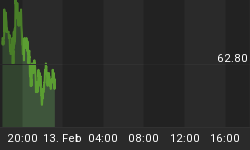(UNEDITED)
According to Wall Street, earnings for the second quarter were pretty good. Eighty-five percent of the S&P 500 companies met or exceeded analysts' estimates. Now before rushing out to margin your account, earnings growth for the second quarter appears to be only 0.3% in aggregate with revenue growth of 1.8%. The good news is this will be the first quarter of earnings growth after five consecutive declines. Adding insult to injury, companies are reducing guidance for the next two quarters. For the third quarter, FirstCall reports that earnings growth estimates have declined to 12.4% from 20.7% on April 1. Similarly, fourth quarter growth expectations for the S&P 500 have fallen to 24.3% from 31.5% at the beginning of the second quarter. It is vital to remember that third and fourth quarter results last year were disastrous, down 21.6% and 21.5% respectively. Some quick math reveals that fourth quarter results will still be 2.5% below results two years ago. It is highly likely that 2000 results will be a high watermark that will not be seen for several years.
Employee stock options were one method companies used to lower their compensation expense. In light of recent pressure, companies are announcing that they will voluntarily expense employee stock options. This will undoubtedly lead to lower earnings. The Financial Accounting Standards Board (FASB) has indicated that they are looking into making it mandatory for companies to expense options, although that would take at least a year to enact. Besides lower corporate profits, another casualty could be employee compensation packages. If options are not a "free" way to compensate employees, it is likely that companies will not issue as many options. This reduction in income will affect consumer spending, especially in big ticket items, which are commonly purchased with bonuses.
The booming economy and stock market flooded the coffers of state and local governments. In typical government fashion, it was spent and future budgets assumed more of the same. Now a majority of the states and countless municipalities are facing budget crunches. Governments are reducing spending, which usually entails layoffs and increasing taxes. Both of these developments will crimp consumer spending.
Insurance rates are also climbing. Health, homeowners, auto, are all rising with horror stories of huge increases. Just a personal anecdote, my health insurance (I elected to buy private insurance rather than enroll in the family package offered by the firm) went up over 30% this year. I fail to find comfort in the fact that I'm not alone. PacifiCare Health Systems announced in it latest quarterly conference call that premium yields per member increased 15%. Additionally, my homeowners insurance increased 60% this year. I cannot compare the car insurance since I helped out the economy and bought a new car in January.
These factors will weigh on the consumer and make it difficult for the recovery to be shouldered by the consumer. Additionally, last year consumers were handed an additional $40 billion from President Bush's tax plan. Plus last year consumers extracted $150 billion by refinancing, which does not include the billions in home equity loans. During the first half of 2001, homeowners cashed out a total of $50 billion. Again there is no hard number for home equity loans. It is evident that there is a lot riding on residential housing. Unfortunately, real estate has to keep escalating in order for homeowners to be able to tap into the equity to supplement spending. Since there has been a widespread boom in refinancing and home equity borrowing, lower interest rates cannot continue to prop it up. There has to be growth in home values in order for homeowners to refinance or borrow.
More and more evidence is starting to indicate that the residential housing market is starting to decline. Pockets of weakness in vacation homes are popping up. This week the Rocky Mountain News reported that Aspen rental reservations were down 5% in July and occupancy rates are in the 60% range compared to the 80% range last year.
The Rocky Mountain News also carried a story detailing the dire situation developing in the Denver area apartment market. Due to concessions being offered to lure renters, the value of apartments has declined by $1.75 billion in the Denver area. According to Jeff Hawks, apartment broker for Grubb & Ellis, the decline in apartment values is worse than the real estate depression of the mid-1980s and early 90s. Hawks also said the only thing keeping apartment communities out of foreclosure are the record low mortgage rates. The crux of the problem is the discounting that apartment communities instituted to lure renters and that apartment managers would have been better off letting vacancy rates rise instead of offering discounts. "Concessions are very easy to offer and very difficult to stop," he said, adding, "Who will have the guts to pull their incentives when a 12-month lease is up, when the guy next door is still offering incentives."
Evidence continues to mount that there is a considerable amount of stress developing in the credit markets. When asked when it would have the right amount of debt for its capital structure, Michael Barrist, Chairman and Chief Executive Officer of NCO Group, answered, "That's a difficult question to answer in a market where you can't get debt. I cannot answer that. The high yield market is basically closed."
Today, Dow Jones Newswires reported that Fitch downgraded the debt rating of Conseco. In the story the author mentioned that there has been, "persistent selling of Conseco Finance's manufactured housing-backed ABS notes in the secondary market."
















